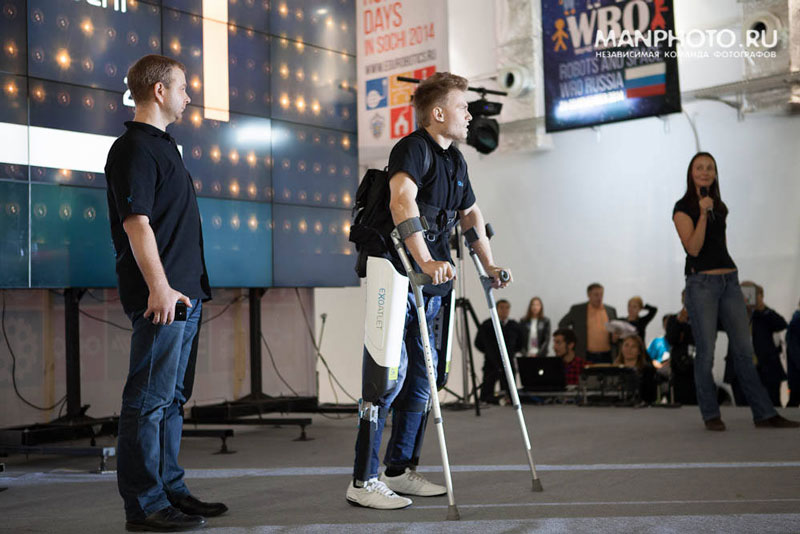
Robohub.org
Sino-Russian robotics boosted as Skolkovo signs $200M deal with Chinese investment fund

As one of Skolkovo’s resident companies, ExoAtlet – which builds medical exoskeletons – stands to benefit from the new agreement. ExoAtlet’s team hopes to create an exoskeleton that will cost as little as $10K.
Russia’s Skolkovo Foundation and the Chinese Cybernaut Investment Group signed an agreement yesterday in Beijing to create a joint Russian-Chinese business incubator, a robotics accelerator program, and an investment fund worth $200M.
The partnership aims to bridge the two countries, with the business incubator supporting at least 15 companies resident at the Skolkovo Innovation Center, and a robotics center located in China that will help accelerate the Skolkovo residents into the Chinese market. The $200M venture fund, provided by Cybernaut, will invest in Skolkovo residents that are conducting research into IT and robotics, space, energy-efficiency technologies and new materials.
The agreement comes into force in the third quarter of 2015 and Skolkovo Senior VP for Innovations Vasily Belov estimates that as much as $50M will be funnelled into Skolkovo companies before the end of the year, but says that it’s too early to say how much of this will go into robotics ventures specifically.
Founded in 2005, Cybernaut is one of China’s largest venture capital and private equity firms, currently managing more than $500M in US funds, and more than ¥50B in RMB. According to Cybernaut Project Manager Xiang Li, the fund “will incubate and help 3-5 companies be listed in China or foreign capital market” each year. Based in Hangzhou, a city known for its manufacturing capabilities in hi-tech sectors such as electronics and medical engineering, the fund typically invests in domestic companies, and is interested in personal service and industrial robotics in China “because China has a huge domestic demands for robotics”. The fund recently created a platform company called their “Cybernaut robotic group” that aims to develop and upgrade the Chinese robotic market: “We are trying to acquire related robotic companies to develop our product line,” said Li.
The Skolkovo deal, which has been in negotiations since 2013, is Cybernaut’s first Russian venture. “The collaboration with Skolkovo is very important for Cybernaut,” said Li. “We are providing the conditions for close collaboration between Russian and Chinese scientists, developers and entrepreneurs, which will allow us to develop and market cutting-edge technology together.”
According to Skolkovo’s Chief Roboticist Albert Yefimov, Cybernaut is now actively negotiating deals in Russia. In an email interview, Skolkovo’s Executive Director of the IT cluster Igor Bogachev said that Cybernaut is “focused on investing in wide range of service robotics, ranging from robotics for mining industry to educational robotics.”
The agreement brings benefits to both parties.
Russia will gain from the influx of cash, as well as access to China’s manufacturing pipelines and marketplace. According to Bogachev, Skolkovo resident companies “will have a chance to continue their development in the Chinese branch of the robotics center in order to get easier access to the local market … like searching for an investor, or locating production lines [and] access to buyers.”
And China stands to gain, too. According to a report in the Chinese-language Economic Observer, and summarized in Want China Times, despite the 36 industrial parks developed for the robotics sector in recent years, “some companies that claim to be creating robots do not have labs, research teams, or the ability to conduct tests.” From that article:
“In China, 50% of the robot makers produce pirated products. They either reverse engineer existing products of foreign companies or buy old robot designs to manufacture as their own,” said QKM Technology president Shi Jinbo.
It would appear that Cybernaut aims to reverse this trend by importing Russian research and technical expertise.
If you liked this article, you may also be interested in:
- Skolkovo conference seeks to jumpstart new areas of expertise for Russian robotics
- Robots Podcast: Russian robotics
- 25 Russian companies added to The Robot Report’s global map of robot providers
- Russia looks inward and outward at Moscow’s 2013 Open Innovations Forum
See all the latest robotics news on Robohub, or sign up for our weekly newsletter.
tags: c-Business-Finance, China, Russia, Skolkovo



